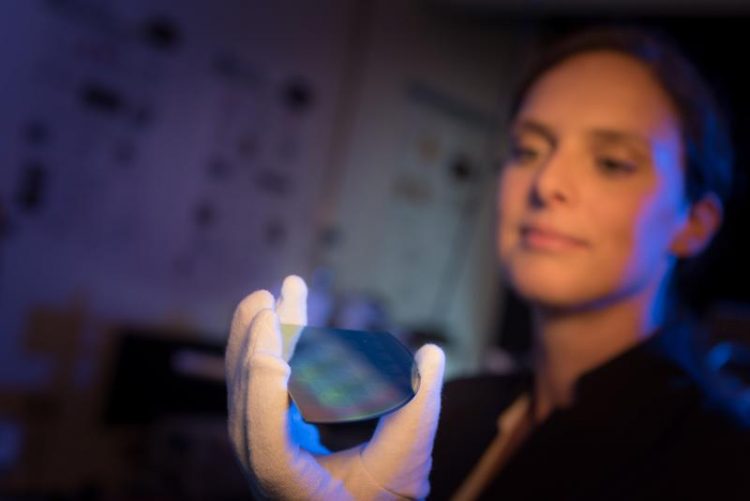3.6 million euros for new quantum-technology project at the University of Stuttgart

Project leader Prof. Stefanie Barz of the Institute of Functional Matter and Quantum Technologies at the University of Stuttgart University of Stuttgart / Max Kovalenko
Digitization and networking are the basis of modern society. Nowadays, not only are IT applications outsourced to the ‘Cloud’, but also real objects are linked to one another, to form an ‘Internet of Things’. Such applications are intriguing, but they also raise the question of data and network security — aspects that are becoming of central importance both from a technological and a socio-political point of view.
The best of two worlds
Against this background, the SiSiQ project aims to develop fundamentally new concepts for secure information processing in networks. The focus is on novel methods that enable secure computations based on the rules of quantum physics. In order to achieve this, the scientists around project leader Prof. Stefanie Barz plan to bring together the best of two already established fields, quantum communication and quantum computing. Their goal is to advance photonic quantum technology and pioneer its use for secure quantum networks.
Photonic silicon technology as a Basis
To do so, they will investigate and implement new types of protocols for data transmission, and will perform distributed calculations in quantum networks based on photonic systems. The latter are ideal for the problem at hand, as quantum information can be both sent and processed in photonic networks. “The essential components of our networks will be based on photonic silicon technology. We will develop efficient single-photon sources as well as integrated silicon circuits,” explains project leader Prof. Stefanie Barz. “Subsequently we will use these networks to explore new possibilities for secure information processing.”
The researchers will study methods for transmitting information and performing calculations in the quantum networks, initially between two network nodes, eventually between several of them. In addition, they will look at possibilities how these networks might be ‘hacked’ — one of several important aspects with a view to utilizing the results of this project in commercial applications.
Bright minds for challenging research Topics
The “Quantum Futur” scheme is a measure of the “Photonics Research Germany” funding initiative launched by the Federal Ministry of Education and Research (BMBF). Its goal is to support excellent young scientists to advance the transition from basic research findings to novel applications.
The SiSiQ project will involve PhD students and postdocs, but also Bachelor and Master students can participate in graduation projects. The SiSiQ project will be funded for five years, starting from 1 September 2018. It is one of around ten projects across Germany being successful in the latest round of funding.
Scientific contact:
Prof. Dr. Stefanie Barz, University of Stuttgart, Institute of Functional Matter and Quantum Technologies and Center for Integrated Quantum Science and Technology IQST, Tel.: +49 (0)711/685 65254, E-mail: barz-office@fmq.uni-stuttgart.de
More about Prof. Stefanie Barz:
http://www.barzgroup.de
http://www.stefaniebarz.de/
Twitter: @StefanieBarz
More about IQST: http://www.iqst.org
Media Contact
All latest news from the category: Awards Funding
Newest articles

First-of-its-kind study uses remote sensing to monitor plastic debris in rivers and lakes
Remote sensing creates a cost-effective solution to monitoring plastic pollution. A first-of-its-kind study from researchers at the University of Minnesota Twin Cities shows how remote sensing can help monitor and…

Laser-based artificial neuron mimics nerve cell functions at lightning speed
With a processing speed a billion times faster than nature, chip-based laser neuron could help advance AI tasks such as pattern recognition and sequence prediction. Researchers have developed a laser-based…

Optimising the processing of plastic waste
Just one look in the yellow bin reveals a colourful jumble of different types of plastic. However, the purer and more uniform plastic waste is, the easier it is to…



